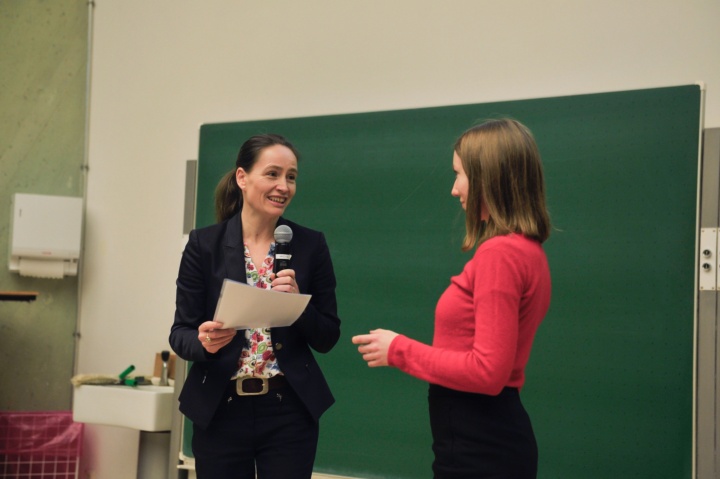“Publishing has a very important role to play in terms of our university’s scientific output”, emphasized Prof. Jan Kippers, Vice Rector for Research at the start of the event. On 31 January, for the third year in a row the university awarded prizes for the best publications from each of the ten faculties as part of the Research Day event. The publication prizes were each worth 2,500 euros. “We want to use the prizes to reward the excellent research done at our university which has been published, and to make it better known outside the respective departments”, said Knippers.
The prize winners then had five minutes to explain the contents of their award-winning publications and the sometimes complicated research topics in a way which was accessible to non-specialists. Some of these presentations were highly imaginative. The crowd learned that transportation problems can also have quite positive effects – at least in the microscopic world of cells. By making an analogy with Stuttgart21 construction sites and traffic jams, Dr. Stephan Eisler showed how disruptions which have been caused deliberately to the transport of substances in cells can lead to the discovery of new signaling pathways. “I've already thought for a while about how I can get the topic across humorously in the little time I have available”, said Eisler, who leads the “Cellular Analytics” technology platform at the Stuttgart Research Center Systems Biology.
Making science accessible
Dr. Mohammad Tourian from the Geodetic Institute took a glass container filled with water, sand and a plant with him into the lecture hall. He then used it to demonstrate how he calculated the volume of water which can be stored in the Amazon with the help of satellite data. By twisting the Napoleon quote “Dress me slowly, I’m in a hurry”, the crowd learned from the physicist Dr. Konrad Breitsprecher that supercapacitors should be charged slowly as stores of electrical energy. The economist Christian Mahringer used the example of the development of post-its by Art Frey which was almost stopped in its tracks to explain how entrepreneurial initiatives are key to a company’s ability to adapt.
Dr. Bettina Nestl explained why synthesizing chemical compounds containing nitrogen is becoming more and more important. “These compounds are being used for synthesizing sildenafil in particular, which is better known as Viagra. This does more than enable people to have a fulfilling sex life, it also helps protect species because a lot of natural virility-enhancing drugs come from endangered species”. The junior group leader at the Institute of Biochemistry and Technical Biochemistry has developed a new procedure with her team to produce the source material for a number of substances and pharmaceuticals, such as for example Viagra.
Surprising insights
There were interesting presentations from all faculties and some of them were very surprising, such as for example the fusion of literature and mathematics by Nina Engelhardt from Faculty 9, as was mentioned by the prize-winner Daniel Förster. The mathematician and physicist will shortly finish his doctoral degree studies at the Institute of Laser Technologies, but in the meantime he has founded a start-up for the removal of materials using a laser together with a colleague. Among other things, the start-up is based on findings from the research paper which was given an award.
Doris Lindner, who worked on the award-winning presentation from Faculty 1, said that the prize is “a great recognition and the icing on the cake for the publication, which is an unbelievably great thing in itself”. She says that the publication is the culmination of three long years of work, when an interdisciplinary team left their ivory tower in order to research with actors from various elements of civil society. In the process, the city of Stuttgart became a giant testing ground for sustainable mobility.
PRIMA! Prize for outstanding female scientists
In addition to the publication prizes awarded by the university, the Gender Equality Officer, Prof. Nicole Radde, awarded the PRIMA!-Prize 2019 for outstanding dissertations by female graduates at the university. The prize is worth 1,000 euros, and is awarded by a different faculty every year on a rotating basis. It was created six years ago to mark the 100th anniversary of the first woman to be awarded a diploma by the Technical University of Stuttgart, the chemist Nora Kräutle. This year, the prize went to the aerospace graduate Anna Schwarz in Faculty 6 for her master's thesis entitled “A Neural Network-Based Shock Indicator for High Order Methods”.
After awarding the prizes, Vice Rector Knippers presented the university’s new funding program “Terra Incognita” for interdisciplinary frontier research in fields which have not yet been explored. The first six projects which are being funded by the program are already underway. Knippers also presented the “Integrated Computational Design and Construction for Architecture” (IntCDC) Cluster of Excellence, which began last year.















